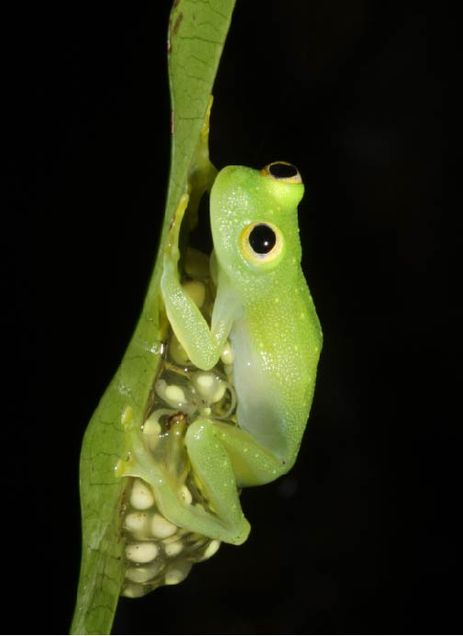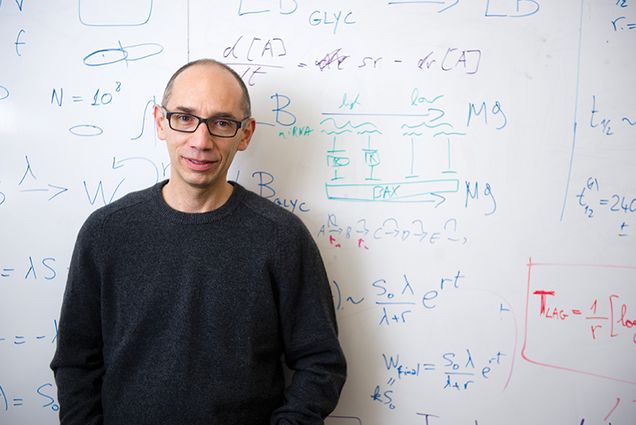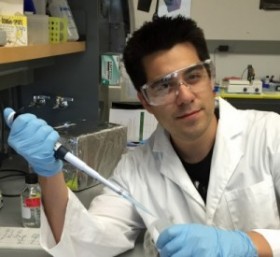Warkentin Lab Research in the Journal of Experimental Biology

Kristina Cohen, Marc Seid, and Prof. Karen Warkentin, recently published a paper in Journal of Experimental Biology reporting their findings on how red-eyed treefrog embryos escape from danger. Seid, a professor at University of Scranton who did his PhD in insect neurobiology at BU with Prof. James Traniello, collaborated with the Warkentin Lab at the Smithsonian Tropical Research Institute in Panama. The team used a variety of approaches, including high-speed videography, manipulation of embryos in the process of hatching, and electron microscopy to uncover the mechanism by which these embryos hatch in seconds when attacked by snakes and wasps. Images from the high-speed video were featured on the journal cover, and the article was highlighted in Inside JEB. The paper has received extensive media coverage, including in National Geographic’s Phenomena, Science Magazine, Live Science, The Verge, and The New York Times. Boston University also shared a video of the research on their Facebook page which has been viewed over 2 million times!
Cohen, K.L., M.A. Seid & K.M. Warkentin. 2016. How embryos escape from danger: the mechanism of rapid, plastic hatching in red-eyed treefrogs. Journal of Experimental Biology. 219: 1875-1883. DOI: 10.1242/jeb.139519
Ho Lab Research Featured in CAS Magazine
The research of the Ho lab, directed by Associate Professor of Biology Angela Ho and Research Assistant Professor Uwe Beffert, was recently featured in the College of Arts & Sciences magazine. Their research, funded by the National Institutes of Health and the Harold and Margaret Southerland Alzheimer’s Research Fund, investigates the cellular and molecular basis of human brain diseases, including Alzheimer's Disease and autism.
Professor Daniel Segrè at the White House
 Dr. Daniel Segrè, a Professor of Biology and Biomedical Engineering, and a member of the Bioinformatics program, recently attended an event at the White House as part of the launch of the National Microbiome Initiative by the White House Office of Science & Technology Policy. This event coincides with BU’s own microbiome initiative, which will be launched with a Fall 2016 conference: Microbes at Multiple Scales: From Genes to the Biosphere. These initiatives will involve modeling microbial systems, environmental and human health impacts, and applying the techniques of synthetic biology to microbiome research.
Dr. Daniel Segrè, a Professor of Biology and Biomedical Engineering, and a member of the Bioinformatics program, recently attended an event at the White House as part of the launch of the National Microbiome Initiative by the White House Office of Science & Technology Policy. This event coincides with BU’s own microbiome initiative, which will be launched with a Fall 2016 conference: Microbes at Multiple Scales: From Genes to the Biosphere. These initiatives will involve modeling microbial systems, environmental and human health impacts, and applying the techniques of synthetic biology to microbiome research.
PhD Students to Attend International Seminar in South Korea
Ph.D. students Darcy Gordon (Traniello Lab) and Alla Yalonetskaya Hamilton (McCall Lab) will be attending the Ewha-Luce International Seminar (ELIS) in South Korea in July 2016. The program is supported by Ewha Womans University and the Henry Luce Foundation as part of their efforts to cultivate the next generation of global female leaders in science.
PhD Student Jesse Delia Receives BU Graduate Research Abroad Fellowship and Thomas H. Kunz Award

Jesse Delia, a PhD student working with Dr. Karen Warkentin, has received a long term Graduate Research Abroad Fellowship (GRAF) and a Thomas H. Kunz Award to support his field studies at the Smithsonian Tropical Research Institute in Panama. With these funds, Jesse will be able to spend the entire rainy season (June–November) in Panama, studying "Father-embryo interactions in a Neotropical glassfrog." Jesse's 2016 field research builds on studies conducted in 2015 with support from the T. H. Kunz Fund, which was established to support graduate research in Ecology and to honor Biology Professor Thomas Kunz's research in Ecology and contributions to the Biology Department.

MCBB Student Clarke Gasper in Washington DC
 Molecular Biology, Cell Biology & Biochemistry (MCBB) Graduate student Clarke Gasper took part in the Catalyzing Advocacy in Science and Engineering workshop sponsored by the American Association for the Advancement of Science and visited with Capitol Hill staff on April 17 through 20th.
Molecular Biology, Cell Biology & Biochemistry (MCBB) Graduate student Clarke Gasper took part in the Catalyzing Advocacy in Science and Engineering workshop sponsored by the American Association for the Advancement of Science and visited with Capitol Hill staff on April 17 through 20th.
Traniello Lab Received Wide Media Attention

Research in the Traniello Lab on the neurobiology of senescence in social animals has received wide media attention, including articles on “Why ants don’t get Alzheimer’s” published in Discover Magazine, the Smithsonian Magazine and Der Spiegel, as well coverage on BU Today and many other science news outlets. Prof. Traniello was also interviewed on the research for a science broadcast on Danish radio. The study, published in the Royal Society journal Proceedings B, found that behavioral performance did not decline in Pheidole dentata minor worker ants over the majority of their 140-day lifespan, and that cell death in the brain did not increase with age while levels of the neurotransmitters serotonin and dopamine rose rather than declined in “elderly” ants.
Biology PhD Students Recognized by the National Science Foundation
Four Biology Department PhD students were recognized by the National Science Foundation for their applications for Graduate Research Fellowships. Marine Biology PhD student Karina Scavo was awarded a 3-year Graduate Research Fellowship. Karina is co-mentored by BUMP Professors Les Kaufman and John Finnerty. Karina will integrate her research on corals with teaching by mentoring Marine Semester students. Biology PhD students Leah Williams and Julie Jung and MCBB PhD student Maggie O'Connor received Honorable Mention recognition based on their applications. We congratulate these students for their achievements!
Dr. Daniel Segrè awarded Human Frontiers Science Program research grant

Dr. Daniel Segrè, a Professor of Biology and Biomedical Engineering, and a member of the Bioinformatics program, was recently awarded a Human Frontiers Science Program research grant award. The Human Frontiers Science Program is a granting agency that promotes international collaborative research. For this award, Dr. Segrè will be working with colleagues Hans-Peter Grossart (Germany), Maren Voss (Germany) and Daniel Sher (Israel) to study experimentally and computationally the interactions between marine microbes relevant to global biogeochemistry.
Albert Mondragon Awarded NIH NRSA
 Molecular Biology, Cell Biology & Biochemistry (MCBB) PhD student Albert Mondragon of the McCall Lab has been awarded a 3 year Ruth L. Kirschstein Predoctoral Individual Research Service Award from the NIH. The grant is entitled "Investigation of non-autonomous cell death and corpse clearance” and Albert will use the award to study the role of lysosomes in a novel form of cell death in Drosophila.
Molecular Biology, Cell Biology & Biochemistry (MCBB) PhD student Albert Mondragon of the McCall Lab has been awarded a 3 year Ruth L. Kirschstein Predoctoral Individual Research Service Award from the NIH. The grant is entitled "Investigation of non-autonomous cell death and corpse clearance” and Albert will use the award to study the role of lysosomes in a novel form of cell death in Drosophila.